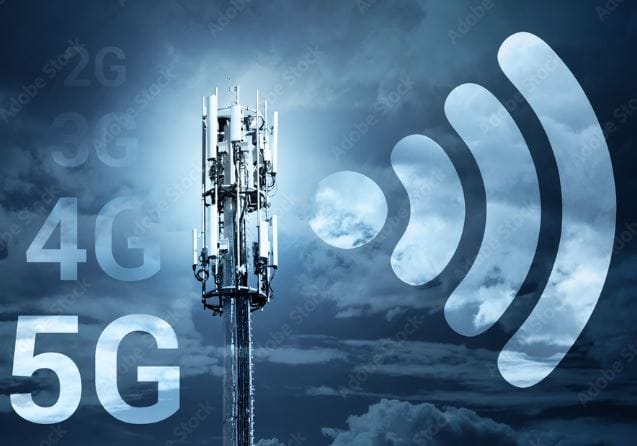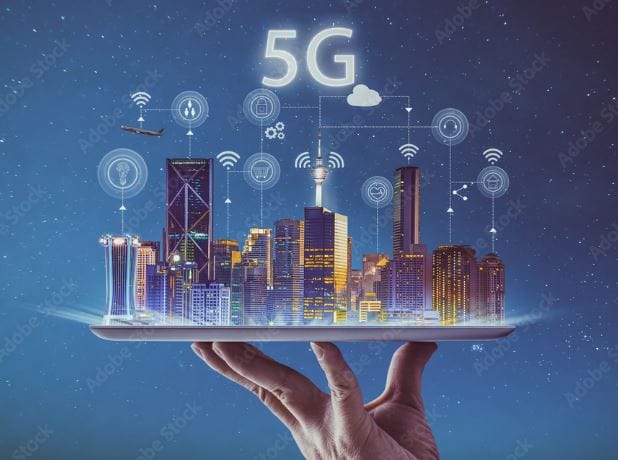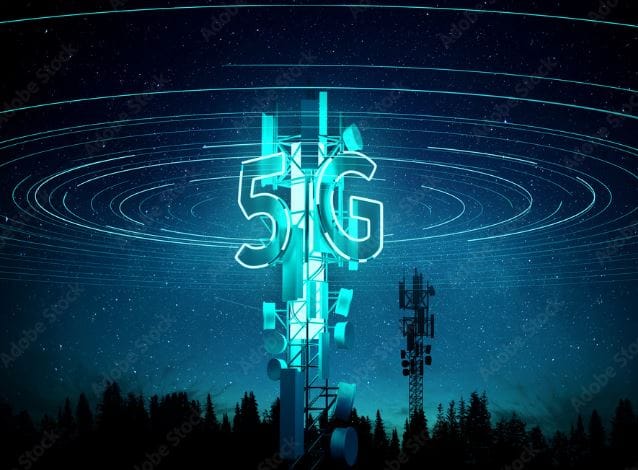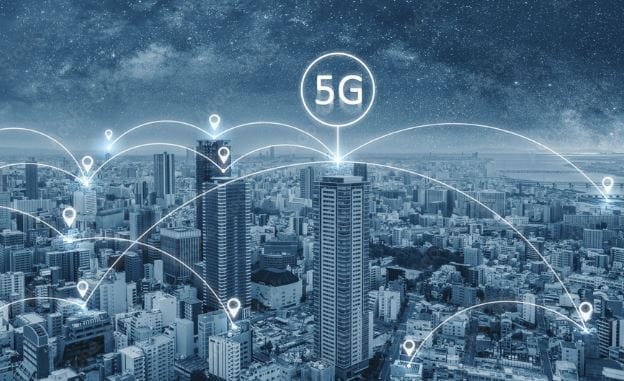Technology advancements through 5G provide revolutionary changes that enable unbearably fast speeds along with exceptional reliability and massive scalability. The wireless communication evolution reached its fifth generation with 5G which provides a complete transformation beyond 4G LTE to reshape business operations and technological social interactions. The 5G technology will control worldwide connections by 2025 thus fueling industry progress and achieving better social results. This article delves into the profound impact of 5G on both business and society.

👉What is 5G?
The fifth generation mobile network technology known as 5G intends to exceed past speed and latency capabilities with high connectivity standards. The speed capabilities of 4G networks reach between 5 to 12 Mbps but 5G networks can deliver speeds exceeding 10 Gbps. 5G promises real-time responsiveness through its low latency performance of less than one millisecond which makes it suitable for automation in vehicles and VR systems along with IoT technology.
https://en.wikipedia.org/wiki/5G
👉The Impact on Business :-
1. Enhanced Operational Efficiency :-
The fast and dependable network lets businesses optimize their operations and enhance their productivity levels. 5G networks enable easy execution of tasks that involve large-scale data transfers and real-time analytics and cloud computing. For example:
⏩Documents Sharing :- Teams gain improved decision-making capabilities through their ability to instantly share large files through the Document Sharing feature.
⏩Automation :- The faster speeds in 5G networks improve the speed of automated systems which leads to decreased operational downtime.
2. Support for Remote Work :-
Remote work became more widespread because of the COVID-19 pandemic even though connectivity issues remained a problem. Acquiring real-time collaboration becomes possible through 5G’s high-speed network capabilities because it offers seamless video conferencing features along with AR/VR-powered virtual environments. The implementation of 5G technology promotes better teamwork among remote workers.
3. Revolutionizing E-Commerce :-
The customer experience in e-commerce grows better through 5G because it provides fast website page loads and efficient online payment processes. The system decreases shopping cart abandonment while simultaneously improving customer satisfaction. Additionally:
⏩Dynamic Promotion :- High-quality media content transmission operates in real time through Dynamic Promotions for promotional marketing campaigns.
⏩Scalability :-The expansion of digital services becomes possible for businesses through 5G because bandwidth limits no longer restrict their growth.
4. Internet of Things (IoT) Integration :-
It supports the simultaneous connection of billions of devices which sets a new standard for IoT applications.
⏩Predictive Maintenance :- Real-time equipment monitoring through sensors allows manufacturing plants to make predictions about machinery breakdowns.
⏩Smart Inventory Management :- Retailers benefit from IoT-enabled devices to achieve automated stock tracking in their inventory management.
5. Industry-Specific Innovations :-
Several business sectors will see major advantages by implementing 5G technology.
⏩Healthcare :- The healthcare industry makes remote surgical operations and telemedicine achievable due to ultra-low latency.
⏩Transportation :- Self-driving vehicles achieve real-time data sharing through 5G networks for their operations.
⏩Retail :- Long-term Retail business gains success through VR-powered virtual dressing rooms that improve customer interactions.
6. Cost Optimization :-
Lower operational expenses become achievable when businesses use 5G to enhance efficiency while decreasing latency.
For instance:
⇒Cloud solutions eliminate the requirement for high-cost hardware installation at company facilities.
⇒Technology allows data centers to decrease their power usage by speeding up processing operations.

👉Social Impact :-
1. Bridging the Digital Divide :-
5G technology demonstrates its most substantial advantage through its ability to deliver quick internet access to communities currently without proper connectivity. 5G technology brings equal opportunities to educational services and health services and employment prospects through its distributed connectivity structure.
2. Smart Cities :-
Technology creates a basis for smart cities through its ability to link urban systems which enhance city living conditions:
⇒Real-time tracking using traffic management systems decreases road traffic congestions.
⇒Smart grids operate to enhance power distribution networks where they cut down on energy losses.
3. Education Transformation :-
The interaction in remote learning improves because 5G powers AR/VR applications for educational use. Through virtual labs students together with immersive lecture attendance they no longer need to be physically present to take part in educational programs
4. Environmental Sustainability :-
5G technology allows both business travel and commuting to decrease which in turn reduces carbon emissions because workers can perform their duties remotely and collaborate virtually. Additionally:
⇒Water and power maintenance now become more efficient through 5G-based real-time monitoring of resources.
⇒Energy-efficient networks minimize environmental impact.
5. Enhanced Public Safety :-
5G generates quicker emergency response services through its fast communication capabilities.
⇒Real-time visuals from drone cameras become available during natural disasters through their equipped cameras.
⇒Emergency personnel gain immediate access to vital details by using connected technological hardware.
👉Challenges in Adopting :-
The implementation of it faces various difficulties though it presents vast transformation possibilities.
⏩Infrastructure Cost :- A nationwide or global network infrastructure creation demands substantial financial investments.
⏩Cybersecurity Risk :- The network becomes more vulnerable because more devices link to it.
⏩Regulatory Hurdles :- Governments face the dual responsibility of creating equal access policies that handle privacy matters.

👉Security Concerns :-
The advantages of this technology for businesses are transformative yet they generate substantial security problems. Businesses must understand these primary security problems that arise from using 5G technology:
1. Increased Attack Surface :-
The increased number of devices that 5G connects includes both IoT devices and edge devices. The network’s expansion produces more attack points which creates monitoring and security challenges for all endpoints. Businesses which permit personal devices or run Bring Your Own Device (BYOD) programs expose themselves to additional security risks because unsecured personal devices lack essential security features.
2. Device Vulnerabilities :-
Security protocols installed on IoT devices linked to 5G networks remain inadequate thus making these devices vulnerable to both botnets and ransomware attacks. IoT manufacturers give priority to device functionality above security measures which creates security gaps that business operations must face.
3. Network Slicing Risks :-
Network slicing through 5G technology allows the creation of separate virtual networks using a single physical infrastructure. Network slicing enhances operational efficiency yet incorrect security setup permits attackers to breach one virtual network system and gain access to other interconnected networks until the entire network becomes compromised.
4. Supply Chain Threats :-
The worldwide infrastructure supply chain for 5G depends on multiple vendor partners who might expose security risks through insufficient security measures or by belonging to geopolitical entities. Attackers have the ability to exploit vulnerabilities in supply chain components which have been compromised.
5. Distributed Security Challenges :-
Unlike previous centralized network models, 5G relies on decentralized software-defined networks (SDNs). The transformation eliminates single monitoring points for control which results in reduced capabilities to discover and neutralize security threats during real-time operations.
6. DDoS Attacks :-
The faster speeds and lower delays that 5G provides enable Distributed Denial of Service (DDoS) attackers to command more destructive power. The quick connection speed provides attackers with the ability to carry out high-speed network attacks which exceed protection system response time.
7. Privacy Concerns :-
5G-connected devices create vast amounts of data which leads to privacy problems. The unauthorized exposure of sensitive business data along with customer information results in financial losses and damages the reputation of the affected businesses.
8. Misconfigured Equipment :-
Enterprise deployments become vulnerable because companies fail to comply with security standards defined by the 3rd Generation Partnership Project (3GPP). Poor equipment configuration together with cost reduction practices creates security risks for businesses.
9. Cyberespionage Risks :-
Ethnic government operatives use modern 5G technology to commit cyberespionage through targeted malicious email campaigns and data intrusion.
👉Mitigation Strategies :-
The following steps should be implemented by businesses to combat these risks:
⇒Businesses need to deploy powerful endpoint security solutions which protect IoT devices along with edge devices.
⇒Organizations should implement strong isolation protocols during network slice configuration processes.
⇒Organizations need automated monitoring systems to automatically discover and handle security threats distributed among various networks.
⇒Your organization should thoroughly vet suppliers because it helps reduce potential security weaknesses in supply chain systems.
⇒Follow all industrial standards which 3GPP has outlined.
⇒Employ real-time traffic visibility tools for proactive threat detection.
Businesses can reap the benefits of its technology through proper security measures that address its identified challenges.

👉Industries Most Benefited :-
5G technology delivers transformative advantages to various industries because of its fast speed combined with quick response times and strong abilities for multi-device connectivity. The following industries demonstrate the most substantial effects from 5G technology implementation:
1. Healthcare :-
⏩Telemedicine :- This technology facilitates high-definition video assessments and remote testing that enhances healthcare delivery especially to populations without sufficient medical services.
⏩Remote Surgery :- Medical professionals can conduct robotic surgeries through 5G networks which provide high quality real-time transmission needed for precise surgery execution.
⏩IoT in Healthcare :- Real-time patient data stream through IoT healthcare devices and remote systems enables quick health condition discovering and ongoing medical care.
2. Manufacturing :-
⏩Smart Factories :- 5G supports automation and IoT integration, enabling real-time monitoring and predictive maintenance of equipment.
⏩Cost Efficiency :- Industry costs decrease because wireless 5G networks eliminate the requirement for extensive cabling and replace industrial ethernet.
⏩AR/VR Applications :- Laborers receive training and conduct maintenance tasks through AR/VR glasses which advance their operational effectiveness while maintaining protective conditions at work.
3. Transportation :-
⏩Autonomous Vehicles :- This facilitates vehicle-to-vehicle (V2V) and vehicle-to-infrastructure (V2I) communication, essential for self-driving cars.
⏩Logistic Optimization :- Current supply chain operations gain performance efficiency through fleet and goods tracking capabilities.
⏩Smart Cities :- The city infrastructure benefits from enhanced data management systems which help decrease transportation traffic levels.
4. Retail :-
⏩Enhanced Customer Experience :- 5G’s low latency enables the creation of virtual reality (VR) dressing rooms together with personal shopping experiences for customers.
⏩Mobile Commerce :- The speed improvements of Mobile Commerce enable secure mobile transactions which decreases shopping cart abandonment on mobile devices.
⏩Inventory Management :- Real-time inventory management through IoT systems ensures automatic stock tracking which maximizes retail supply chain operations.
5. Media and Entertainment :-
⏩Streaming Services :- 5G networks provide extremely fast speeds which deliver unbuffered streaming of 4K/8K content to users.
⏩AR/VR Gaming :- The quick response time of 5G technologies permits seamless gaming along with virtual events that provide total immersion to players.
⏩Interactive Content :- Real-time and personalized media content becomes accessible through multiple platforms for users through interactive delivery systems operated by companies in the media industry.
6. Agriculture :-
⏩Precision Farming :- Agriculture companies merge their Internet of Things sensors into one network through 5G to track farm soil health and crop conditions alongside weather patterns thus they achieve optimal crop growth.
⏩Livestock Management :- Connected devices implemented by farmers help monitor both animal wellness and their locations which enhances both operational efficiency and operational safety.
⏩Automation :- Autonomous tractors along with drones use 5G networks for their data collection and navigation abilities.
7. Financial Services :-
⏩Faster Transactions :- The mobile banking and payment processing systems become faster through 5G which provides users with improved convenience.
⏩Remote Banking Services :- The high-speed network enables financial institutions to offer virtual teller services and remote customer assistance through remote banking services.
⏩Fraud Detection :- Computer systems equipped with artificial intelligence analyze data immediately while they detect suspicious fraudulent activities. Documentation indicates that these tools enhance the security mechanisms of detection.
8. Energy and Utilities :-
⏩Smart Grids :- The power distribution through 5G becomes faster and more efficient because the network enables immediate energy location and distribution operations for Smart Grids systems.
⏩Renewable Energy Management :- The 5G network connects IoT devices which boost the operational efficiency of both solar panels and wind turbines.
⏩Disaster Response :- Utilities use connected sensors to perform rapid detection and fast response in disaster situations.
9. Augmented Reality (AR) & Virtual Reality (VR) :-
⇒The manufacturing and healthcare sectors together with entertainment and retail industries use 5G technology’s low latency to create smooth operations for their AR/VR applications.
⇒The integration of AR technology helps surgeons during operations while manufacturing companies utilize VR platforms to educate their staff members.
👉Conclusion :-
The launch of 5G technology represents a critical advancement in technological progress which brings unlimited possibilities for both business operations and public welfare development. The extensive implications stem from IoT industry revolution and societal linkage through better connectivity systems. The complete empowerment of 5G depends on solving current infrastructure hurdles along with cybersecurity protection requirements.
The competitive advantage for businesses leveraging 5G technology brings both operational efficiencies and innovation opportunities against organizations that do not embrace this technology transition. The general public will gain improved life quality because 5G technology enables smarter cities and better healthcare services and digital inclusion.
The implementation of 5G serves as a technological cornerstone which will construct both a more linked and efficient and equitable future for all.
This article presents an introduction to 5G technology which will transform business operations through its impact on education and public safety alongside healthcare delivery and sustainability initiatives even though it faces forthcoming difficulties.
💬Disclaimer :-
This Blog provides general information as an educational source only. The author uses their life experiences together with personal viewpoints to create all content. The author accepts no responsibility for damages or losses when users apply this information. The website information depends on your individual acceptance of personal risk when you use it. The information does not serve as professional guidance, so readers need to seek proper professional advice before implementing decisions from the provided content.